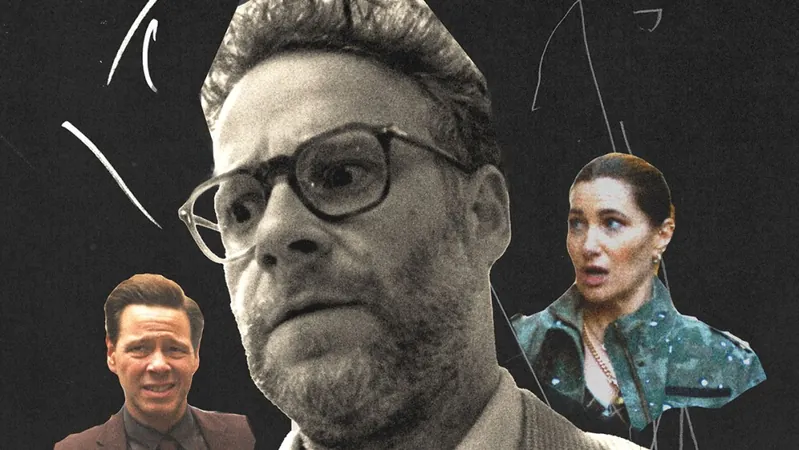
Seth Rogen Unleashes Hollywood's Secrets: From Sony's Infamous Hack to the Risqué Satire of 'The Studio'
2025-03-26
Author: Lok
Seth Rogen Unleashes Hollywood's Secrets: From Sony's Infamous Hack to the Risqué Satire of 'The Studio'
In 2003, a young Seth Rogen, still riding the wave of his breakthrough series “Freaks and Geeks” and before his comedic triumph in “Superbad,” stepped into a Hollywood conference room with Evan Goldberg, his longtime friend and collaborator. The duo pitched an ambitious teen sex comedy—a quirky concept dubbed “Gen CCX”—set in ancient Rome. While the screenplay never saw the light of day, one poignant remark from an industry executive stayed with Rogen across two decades: “I love movies, but now I have this fear that my job is to ruin them.”
Fast forward to today, and this ironic sentiment is at the core of Rogen's latest project, “The Studio,” a biting satire set to premiere on Apple TV+ on March 26. In the show, Rogen plays Matt Remick, a young film studio head who grapples with the relentless clash between artistic intention and commercial viability in a world dominated by greed and market trends.
“The Studio” is a comedic opus starring an ensemble of talent including Catherine O’Hara, Kathryn Hahn, and Ike Barinholtz, mirroring the self-referential energy of “Entourage” alongside the satirical punch of “Veep.” Rogen himself describes the series as a raucous takedown of Hollywood’s insipid politics and the egos that inflate its production warehouses.
Rogen's journey through Tinseltown is nothing short of extraordinary. From launching his career as a teenage stand-up comic in Vancouver to producing iconic comedies like “Knocked Up” and “Pineapple Express,” Rogen has established himself as a formidable force in both mainstream and independent filmmaking. He is not just a star; he’s the mind behind critically acclaimed projects like “The Boys” and “Pam & Tommy,” further solidifying his position in Hollywood’s upper echelon.
A pivotal moment in Rogen's career came during his tumultuous dealings with Sony Pictures, particularly during the fallout of his film “The Interview.” The movie, which involved a plot to assassinate North Korean leader Kim Jong-un, sparked one of the largest data breaches in entertainment history, leaving Sony vulnerable to external cyber threats. This shocking incident, paired with Rogen's subsequent reflections, gave him a fertile ground for storytelling in “The Studio.”
With a plot that includes fantastical ideas—like the studio's gamble on a Kool-Aid movie—Rogen's character embodies the struggle between commercial pressures and genuine artistic expression. With clever cameos from stars like Zac Efron and Zoë Kravitz, every episode consists of uninterrupted takes, providing a fresh viewing experience while intensifying the narrative’s urgency and humor.
The intricate dynamics of studio executives portrayed in “The Studio” reveal a deeper truth: these are not caricatures of evil tycoons but rather individuals pursuing a mix of validation and survival in a competitive landscape. Rogen explores how the relentless pursuit of box-office success often overshadows innovative storytelling.
Rogen's creative team, including his writing partner Goldberg, researched the industry comprehensively, conducting numerous interviews with influential executives to dissect the essence of Hollywood's brand of “art.” The humorous and often absurd discussions about casting decisions and demographic representation in Hollywood reflect Rogen's own real-life experiences. For instance, the character Matt grapples with absurd casting quandaries, such as the implications of casting choices for iconic symbols like the Kool-Aid Man.
Amidst the laughable frivolities, Rogen also critiques Hollywood's increasing inclination towards performative activism instead of real change, addressing how external perceptions often overshadow genuine engagement with significant issues.
As “The Studio” gears up for its release, Rogen remains cautious yet optimistic about the future of films, asserting that true risk-taking in the industry still has a pulse. He highlights how a single, impactful film could disrupt the current trends of cautious filmmaking, reviving originality in a landscape teetering on the brink of conformity.
In essence, “The Studio” is more than just a comedy; it’s a reflection of Rogen's observations and frustrations in the industry. It’s an ambitious, unpredictable venture that beckons audiences to reevaluate the true cost of filmmaking amid the glitz and glamor of Hollywood’s elite.
Could this bold satire be the catalyst for sweeping changes in the industry? Rogen seems to think so, reminding us that beneath the fraught surface lies the potential for creativity to flourish again, provided the right opportunities arise. As he so aptly puts it, “It’s very alluring for studio heads to be part of some sort of course correction… and that’s better than nothing.” Prepare yourself for a wild ride through Hollywood's quirks with “The Studio.”


 Brasil (PT)
Brasil (PT)
 Canada (EN)
Canada (EN)
 Chile (ES)
Chile (ES)
 Česko (CS)
Česko (CS)
 대한민국 (KO)
대한민국 (KO)
 España (ES)
España (ES)
 France (FR)
France (FR)
 Hong Kong (EN)
Hong Kong (EN)
 Italia (IT)
Italia (IT)
 日本 (JA)
日本 (JA)
 Magyarország (HU)
Magyarország (HU)
 Norge (NO)
Norge (NO)
 Polska (PL)
Polska (PL)
 Schweiz (DE)
Schweiz (DE)
 Singapore (EN)
Singapore (EN)
 Sverige (SV)
Sverige (SV)
 Suomi (FI)
Suomi (FI)
 Türkiye (TR)
Türkiye (TR)
 الإمارات العربية المتحدة (AR)
الإمارات العربية المتحدة (AR)